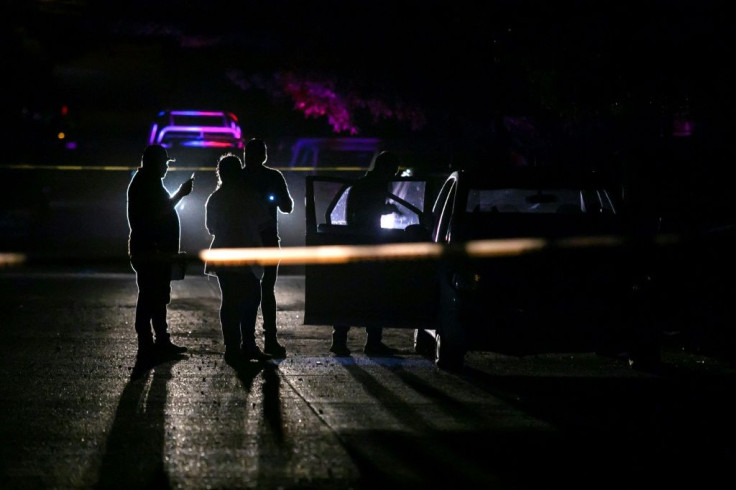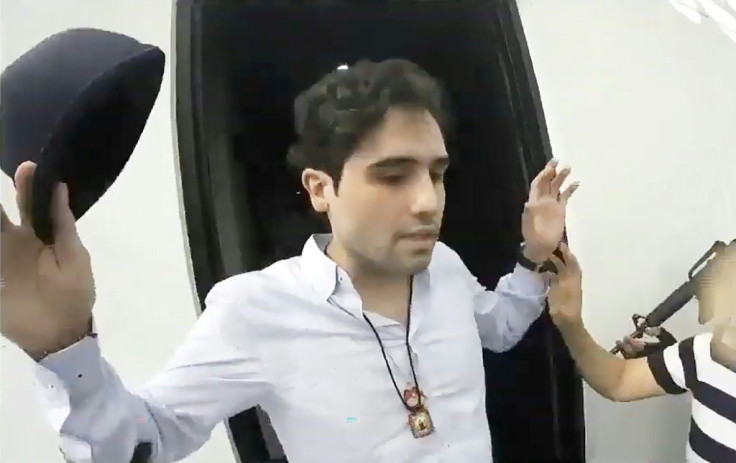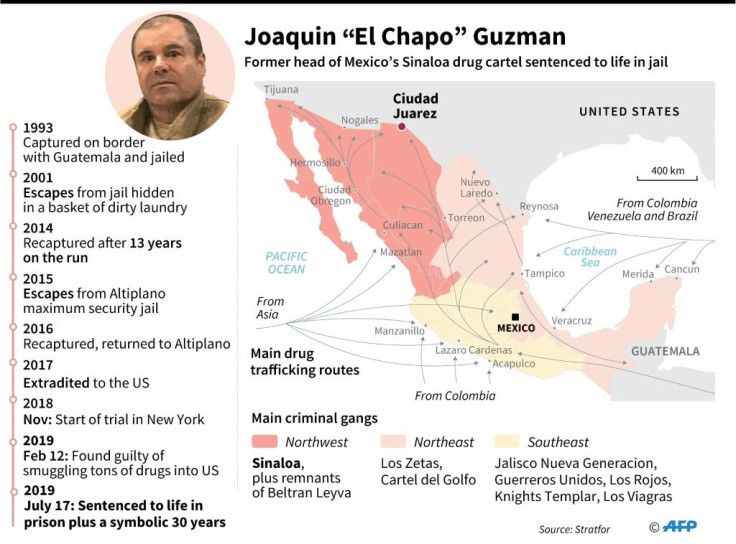Gun Battle Over El Chapo Legacy Leaves 16 Dead In Mexico
The fight for control of drug kingpin Joaquin "El Chapo" Guzman's legacy spilled into the open on Thursday after a gun battle between rival Mexican gangs left 16 dead, authorities said.
The 16 men, heavily armed and wearing bullet-proof vests, died in a six-hour running shootout near the rural town of Tepuche in northwestern Sinaloa province.
"A van with seven bodies was located" after an initial clash, while nine bodies were discovered following a second exchange, Sinaloa's state security minister Cristobal Castaneda told reporters.

Castaneda said Wednesday's clash near Tepuche, 25 kilometers (16 miles) from Sinaloa capital Culiacan, was "part of a struggle between two organized crime gangs in the area."
Local media reported the conflict involved members of the Sinaloa cartel -- pitching a part of the gang run by the sons of ex-leader "El Chapo" Guzman against a faction led by Ismael "El Mayo" Zambada, long considered the group's number two.
The reports pointed to a deep split in what remains one of Mexico's most powerful drug cartels, despite El Chapo's 2016 capture and subsequent extradition to the United States, where he is serving a life sentence.

Castaneda said the rival groups had clashed on eight separate occasions in the area since May 29.
In the aftermath of the shootings, police confiscated 40 high caliber weapons, 10 grenades, 36,000 rounds of ammunition and 24 vehicles, the official said.
Seven of the victims were identified as residents of Tepuche.
An AFP reporter who drove through the town on Thursday found several houses left abandoned by families who had fled the area in fear of escalating violence.

"Most of the people are gone," said a local resident who gave her name as Modesta. "But we stayed, because we have animals here we have to look after," the 63-year-old woman said. "But if the government tell us we have to leave, we'll leave."
Mike Vigil, former head of international operations for the US Drug Enforcement Agency (DEA), said Guzman's three sons -- known as the "Chapitos," or little Chapos -- were engaged in a fight for control of the cartel.
"It's a matter of inheritance. Since their father founded the Sinaloa cartel, they believe they should manage it," Vigil told AFP.

After Guzman's capture, his sons Ivan, Jesus and Ovidio agreed that Zambada would take over in the interim while they "learned the business," said Vigil.
"They only knew how to spend the money, but now they know how the cartel operates and they want to take control, and that's why these disputes are happening."
Vigil said the Chapitos are worried about the future of the cartel if Zambada, a 72-year-old with diabetes, dies and his lieutenants take over.
"The cartel is not yet divided, but it is on that path. Many respect "Mayo" because he is the oldest capo in Mexico, but there is another group that is with the Chapitos because they know that Zambada could die," the former DEA agent said.
A split in the group would likely aggravate Mexico's gang violence because it would strengthen the rival Jalisco Nueva Generacion (New Generation) cartel.
"The Jalisco cartel is the bloodiest cartel, the consequences for Mexico would be unimaginable, and with this government I don't know how it could be faced down," said Vigil.
President Andres Manuel Lopez Obrador favored appeasement when previously challenged by the cartel in October 2019, after Mexican federal forces arrested Ovidio Guzman in Culaican.
Guzman was later released on Obrador's orders after five hours of clashes in Culiacan between the Sinaloa drug cartel and security forces.
Lopez Obrador faced sharp criticism for Ovidio Guzman's release but defended his decision on the grounds that it would avoid widespread bloodshed.
Organized crime has remained active in Mexico, despite confinement due to the coronavirus pandemic.
Specialists and human rights defenders attribute Mexico's drug-related violence to a controversial military crackdown on organized crime launched in late 2006 by then president Felipe Calderon.
According to official data, since then there have been more than 287,000 murders in the country, though it is not clear how many cases are linked to organized crime.





















